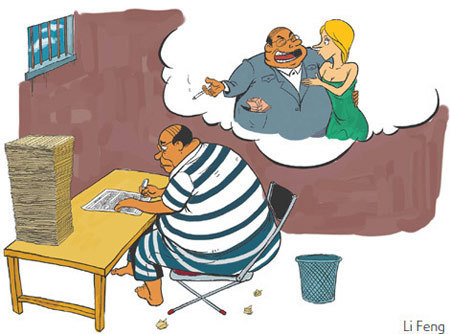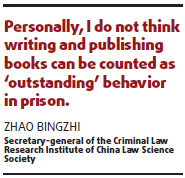Top Biz News
Corrupt officials write for freedom
By Qin Zhongwei (China Daily)
Updated: 2010-01-11 08:05
 |
Large Medium Small |

Behind bars and under convictions of corruption, officials are becoming authors.
Zhou Jiugeng, a former Nanjing official known for his taste for expensive cigarettes and cars, is said to be writing a novel about bureaucracy.
A former director of a real estate management bureau of a district in the southern city of Nanjing, Zhou was convicted of taking more than 1 million yuan ($147,000) and HK$110,000 in bribes from contractors and other officials. He was sentenced to 11 years in jail.

Zhou has completed 300,000 words, Jin Hui, his attorney, said.
The book's theme centers on how officials are forced to toil in bureaucracy, Jin told the Southern Weekly. The title has not been finalized, he said.
Other jailed officials who have already published books include Zhang Erjiang and Li Jianhua.
Zhang, the former secretary of the Tianmen City Committee of the Communist Party of China in Hubei province, was sentenced to 15 years in jail for embezzling public money and accepting bribes in 2002. He has written four books about Chinese classical literature.
The China Research Society of Sun Tzu's Art of War reportedly said that one of Zhang's books about Sun Tzu, an ancient master of military strategy in China, was a "valuable contribution" to the accurate understanding of the famous figure.
Li Jianhua was jailed in 2005 for taking bribes while working as a county official in Henan province. He was sentenced to 11 years in jail. Li won second prize in a domestic calligraphy contest last November; it was the 19th award he has won for his calligraphy, a local newspaper reported.
He has also published three novels and was recruited as a member of the Writer's Association in Henan province in December 2007, while serving time.
Liberator, Li's first novel of 800,000 words on the history of the Chinese army, was published by Changjiang Wenyi Publishing House. It sold almost 10,000 copies, Li Bo, vice-president of the publisher, told the Southern Weekly.
Many of the other authors published their books with the help of families and friends, the newspaper reported.
Most books do not have a strong literary affect, but a few seem to have influenced the sentences of their corrupt official authors.
Prison authorities in Hubei province said Zhang had been given a three-and-a-half year reduction in his 15-year term for making a "special contribution to society" after authoring four books on classic literature, Xinhua reported.
The decision reflected Zhang's "good behavior in rehabilitating himself by writing and publishing four books in prison," according to an announcement released by the Hubei provincial bureau of prison management.
In the preface of one book, Zhang said he wrote in prison because he wanted to "explore the real features of Chinese culture and enhance the confidence of the Chinese people".
But a flood of criticism and doubt appeared on the Internet after the move was announced, with critics taking aim at the quality of his books and the legal validity of the sentence reduction.
According to Chinese law, every prisoner, except those who are deprived of their political rights, can write books in prison. But only those who have shown true repentance or outstanding behavior could have their sentences reduced.
| ||||
"Authorities making such decisions should be cautious," he warned.
And critics also remain skeptical of the imprisoned authors' intentions and writing talent.
"Flying Bear", an Internet user who left his message on the China.com forum, said he is suspicious of Zhang's ability to publish four books in less than seven years.
"How can he manage to write so many books in prison and get them all published?" he said. "That is difficult, even for a college professor."
A Beijing prison management bureau press officer surnamed Xu said there is no direct link between a reduced sentence and writing a novel, but it could earn a prisoner bonus points.
Xu added that he did not know any jailed officials in Beijing who planned to publish anytime soon.
The literary benefits of time in isolation seems to provide a good condition for these officials to concentrate on their writings, but the question is, should the literary world and the readers judge those writers on their crimes, or on their books?













